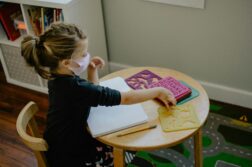
My journey began in the locker room of the YW-YMHA gym. I was rendered paralyzed by the sight of a naked woman applying lotion to her legs. As the trance broke, a question emerged: “Am I gay?” And I was never the same again.
Three little words strung together to form one compelling question, one whose answer seemed unlikely considering I was married for almost two decades to the same man. We were living a typical middle-class suburban life in northern New Jersey, twenty miles outside of Manhattan, only I didn’t yet know that I was anything but typical.
While my marital status led me to believe I couldn’t be gay— a notion I had no conscious thought of prior to that moment in the locker room— the real oddity was that I was having an affair with Raia, a woman I’d met at work, for several months. I never called it an affair. I never called it anything. It happened unexpectedly; an inexplicable addition to my life that I assumed would disappear as randomly as it occurred. Craving the touch of a woman with whom I’d become intimate didn’t spur the three-worded question, but the limited sight of a faceless, nameless naked woman did.
My encounter with Raia started as a mighty force, unlike anything I’d ever experienced. From the moment we met, when she showed up at my office where I work as an occupational therapist, and looked into my eyes as though she wanted to take up residence there, all I could do is look back with the same wonder. We became fast friends, and I was exuberant.
Within months, our friendship took a detour when Raia kissed me, unleashing a storm of emotions. The feelings evoked from my time with Raia were intoxicating. I didn’t understand it but, truth be told, I didn’t try. I knew that my relationship with her had progressed beyond the parameters of friendship, but without the language to name it, I never wondered what it might mean about me.
My life as I knew it, one created with intention, hung in the balance. My psyche couldn’t consider that I was anything but the heterosexual woman I always believed myself to be, one married to a man and raising children—determined to provide them a childhood in stark contrast to the one I experienced as the child of a contentious divorce, with parents who never spoke to one another. But captured by the sight of this naked woman in the locker room, I was forced to ask the question that had eluded me since existing in this other world with Raia, as if it were an out-of-body experience.
Averting my gaze away from the woman applying lotion in the changing room, I sent a text to Raia: Am I gay? She jokingly replied, No, you just like Me, and we never discussed it again. But my journey to figuring out who I was, looking back from the other side of the threshold I unintentionally breached, officially began with that imposing question. I might as well have asked, “Who am I?” as if in some amnesic state, because suddenly I had no idea.
In the small crevices of time between fulfilling the responsibilities accompanying my roles as wife, mom, therapist, and daughter, I sent emails and scoured search engines for any information or help. Every dead end from, “I’m not taking new clients,” to “This is not my area of expertise,” along with the deafening silence of the non-responses to my pleas for help unraveled me a little more.
Nearing the bottom of my proverbial rock bottom, I sat across from a young rabbinic intern in a LGBTQ-friendly Manhattan synagogue who listened to me emotionally purge my story. I wondered if encounters with people like me reinforced someone’s decision to enter the clergy, or caused them to reconsider their career choice.
For an hour I cried to him about Raia, my fears of hurting my children and my husband, and my disbelief that I could be gay. He listened patiently and when our time was over, in lieu of words of wisdom, he handed me a piece of paper with the names of three LGBTQ-friendly organizations I could contact for support. I thanked him, walked outside, and left the resource in a metal trash can in front of the Chelsea temple. That paper was the smoking gun to my crisis, one I kept secret. Although better for having released my fears out loud, I was weighed down by the circumstances.
Reaching out to an author I found online, she counseled me not to say anything until I was sure because, “Once you put it out there, you can’t take it back.” My new mantra bought me time, but my husband was suspicious of my out-of-character behavior. I was more emotional, distracted, and those few and far between times I spent with Raia kept me out late. I hadn’t behaved like this since another platonic, but emotionally-charged, relationship with a woman similarly consumed my attention years earlier.
My husband and I went in and out of couples therapy over the years, but mostly, we just went about our daily routine tending to the kids. We had a physically-satisfying sex life, but emotionally, something always felt missing. As my preoccupation with Raia and my absence around the house increased, so did his concerns. He searched my email only to find one I had written to Raia about feeling joy, at knowing now what I always felt was missing. He asked if I was having an affair but without understanding what it meant about my sexuality or about the implications for my life, I avoided his probing.
I was dangling on the edge of the abyss. All I could see were the faces of my children and echoes of unanswerable questions: What awaits me if I take this deep dive into the depths of my soul? What right do I have to search for something whose unearthing could shatter my family? What obligation do I have to preserve their story or are we better off writing a more authentic one? What right do I have not to take the plunge? Wouldn’t I advise my children to live their most genuine life?
The questions pounded in my head relentlessly, becoming the soundtrack of my days and nights while slowly driving me to the edge before I pulled myself back, only to find myself teetering there again the next day.
Recalling one name from the paper the intern gave me, I sent a cryptic message, worried about who might read it. A woman responded immediately and put me in touch with another woman with a similar story, one I’d soon learn wasn’t so unusual despite my inability to fathom it until it happened to me.
At the same time, Raia and I distanced ourselves to figure out our individual paths. A scaffolding of support emerged for me, as women—strangers—showed up to help navigate the uneven terrain and muddy waters of having a late-in-life realization about sexuality. The support came in the form of phone calls, therapy, and patience, as I sent urgent emails about my kids, my future, and my broken heart about Raia. The women comprising my support network—other late bloomers like me, a cantor, and a therapist— reminded me that kids are resilient and that I will get through this. Breathe, they told me, and I wondered if I remembered how. I wrapped myself in a cloak of their words, putting all my faith in hoping they were right.
By the time my husband asked me to tell him what I hadn’t been telling him, my supporters said, “Tell him, he already knows.” My husband and I sat on the old family room couch and digging deep, I found the courage to say, “I’m struggling with my sexuality.” “I know,” he responded softly. And we cried for what was the beginning of the end of our marriage.
Three little words, one life-changing question, birthed a spiritual quest to know something previously unknown, to find answers to questions I never knew I should ask. I answered the original question from that day in the gym—one sparked by the sight of a naked woman whose face I never saw. My journey led me to answer others along the way until the pieces fell into place, and I opened my eyes to more than my own sexuality.
Through a new lens, I live life with more gratitude, love, and self-awareness. We’re all on a journey, mine led me to authenticity.
 Melissa Giberson is an author and occupational therapist. She’s a late bloomer, a highly sensitive introvert, and a proud mama bear to two children. Her essays have appeared in multiple publications, and she received an Honorable Mention in the Memoirs/Personal Essays category of the 91st Annual Writer’s Digest Writing Competition. Late Bloomer: Finding My Authentic Self At Midlife is Melissa’s first book. You can follow Melissa on Facebook and Instagram, and for information regarding personal appearances or her book please visit her website.
Melissa Giberson is an author and occupational therapist. She’s a late bloomer, a highly sensitive introvert, and a proud mama bear to two children. Her essays have appeared in multiple publications, and she received an Honorable Mention in the Memoirs/Personal Essays category of the 91st Annual Writer’s Digest Writing Competition. Late Bloomer: Finding My Authentic Self At Midlife is Melissa’s first book. You can follow Melissa on Facebook and Instagram, and for information regarding personal appearances or her book please visit her website.






